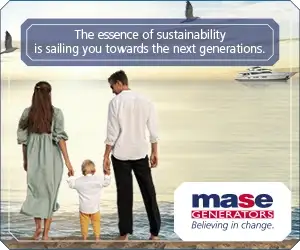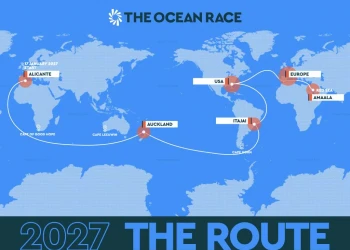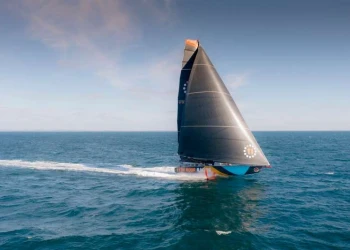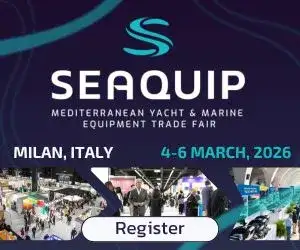
9th January 2023, Sailors Sustainability Briefing is held in the Sailors Terrace, Ocean Live Park, Alicante, Spain. Teams Photo. © Cherie Bridges
The Ocean Race teams commit to protecting the seas
In a joint commitment to protecting and standing up for the seas, skippers and managers, on behalf of each of the 11 teams taking part in the 50th anniversary edition of The Ocean Race, have signed the Race Team Sustainability Charter.
The race’s fleet-wide pledge details actions for the teams across four key themes:
• Advocacy: Teams commit to being a voice for the ocean, raising awareness of the issues affecting it and inspiring their sponsors, partners and legions of fans to help to protect the seas. They also recognise the ocean’s right to thrive and support the Race’s One Blue Voice campaign that calls for a Universal Declaration of Ocean Rights.
• Science: Each boat will carry onboard scientific equipment to gather vital ocean data, helping scientists to better understand the seas and the impact of human-activity on them, contributing to the United Nations Decade of Ocean Science.
• Learning: Teams will help to amplify The Ocean Race’s Learning programmes, which teach young people about the threats to the seas and empowers them to take action. They will also visit schools to run ocean-based workshops and host them on their boats to help them get an insight into life at sea.
• Operations: Among the 10 operational commitments, teams are required to have renewable energy onboard, avoid all single-use plastic and minimise, measure and balance their unavoidable greenhouse gas emissions.
In addition to The Race Team Sustainability Charter, which features in the Notice of Race (the rules governing the event), all sailors and shore crew are asked to sign a Personal Promise, a code of conduct of individual actions to help to protect their racetrack. Each team also has their own project or mission that they are using their platform to grow support for.

Meegan Jones, Sustainability Advisor at The Ocean Race, worked closely with the teams to develop the Charter. She said: “Sailors have seen more of the ocean than most people on the planet, making them its best ambassadors. It’s fantastic to see the teams putting sustainability and ocean protection at the heart of what they do. While they are competitors at sea, the Charter unites them in a shared vision of a healthy blue planet. We can’t win the race for the ocean alone, by coming together as a fleet to protect the seas we can speak as one, with a much louder voice.”
Five IMOCA teams will race in the 60,000km route around the world, while six VO65 boats will compete for The Ocean Race VO65 Sprint Cup over three stages of the race.
Simon Fisher, navigator for 11th Hour Racing Team said: “No matter how far off shore you go, you can always see the influence of mankind. I think it is incredibly important for us as sailors to look after the ocean. It’s our playground, it's our workplace, it’s where we go everyday to do what we love. What better stewards for the ocean than us.”
Benjamin Dutreux, co-skipper from GUYOT environnement - Team Europe said: “We have a lot of action in the team to protect the ocean. I am confident my team and all the members will be a good example for the next generation. I am really happy to see The Ocean Race and their partners be part of ocean rights. I think it is very important for the future.”

© Cherie Bridges / The Ocean Race
Boris Herrmann, skipper for Team Malizia said: “Recognising the importance of the ocean means recognising that we all depend on the ocean and for life on this planet to continue we must preserve the health of the ocean. We support The Ocean Race and their work towards the Universal Declaration of Ocean Rights.”
This edition of the Race is set to be the most sustainable to date, with the Racing with Purpose sustainability programme, which was created in collaboration with 11th Hour Racing during the last edition of the Race, amplified even further. The event aims to reduce its greenhouse gas emissions by 75% compared with the previous edition of the Race and, as well as working with teams, is supporting partners, suppliers and host cities to measure and reduce their impact.





